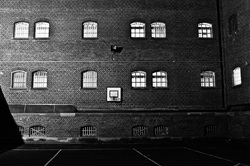
All kidding aside, that last sentence has been elevated to some degree of importance in recent days because of a ruling by 2nd District Judge Michael Allphin. He ordered an end to Davis County’s practice of charging inmates $10 for every day they stay
| | in jail. The charge, he said, was a form of restitution. The justice system hands down sentences, which may include fines, as a way for criminals to repay their debts to society and, one hopes, become rehabilitated. Jails exist to carry out those sentences, not to impose extra fines of their own. That makes sense. It also means it’s best to get out of the way of the get-tough pendulum, which seems to be careening in the opposite direction from where it was going a few years ago. Back in the ‘90s, a politician couldn’t go wrong by talking about locking people up and throwing away the key. Some states looked to the great American pastime, baseball, for guidance. Three-strikes laws guaranteed life sentences to people with three felony convictions, regardless of the severity of their crimes or their ability to hit a curve. Apparently, no one had the patience for a football policy, which might have given people four downs before punting them away. Hockey was out of the question. Let the Canadians give people two minutes in the box for assault. In 2007, the Utah Legislature passed a law that allowed local jails to charge inmates up to $46 a day in rent. It was a policy that dovetailed nicely with the need, not often readily borne by citizens of any state, to pay what it costs to run jails. Today, after years of declining crime rates, we hear more about alternative sentencing than getting tough. It’s popular to think of drug users as people in need of help, rather than as criminals. States are legalizing marijuana, for heaven’s sake. Rehabilitation seems to be taking center stage. You can hear the whoosh of the oncoming pendulum. While Americans are never too far away from getting tough again if they have to, the absurdity of the Pay for Stay program is becoming apparent. Inmates tend to be low-income. The policy could be said to be easiest on white-collar criminals, while adding an extra burden to the neighborhood meth addict who already has a lot of problems. And while Utah’s jails have all sorts of incentives to help inmates pay their bills when they are released (Salt Lake County gives a 50 percent discount to those who pay the entire balance during the first week of freedom — hmm, where could they get that kind of money quickly?), the jails have no power to go after former inmates who don’t pay. There is some good news to consider in all this. Utah has a record of being not quite as nutty as other states when it comes to strange policies, and this is no exception. In California, jails not only charge rent, they allow inmates to pay extra for better accommodations. For $155 a day, inmates at a jail in Fremont can access cable TV on a widescreen. They still have to share bathrooms and showers, but it’s quieter than where the lower-income riffraff stay. “You don’t get a warm cookie on your bed,” a police official wryly told WTKR. Obviously, it hurts a little less to commit crimes there if you’re wealthy. To the state, that bit of unfairness apparently is worth the millions the program collects for cash-strapped local governments. And that really is what this is about. According to a Deseret News story, Davis County collected $369,000 from its Pay for Stay program in 2013. But at what cost? Public officials can’t be blamed for finding ways to save public money. But there are good reasons why taxpayers ought to pay the full cost of enforcing the laws their representatives pass. Otherwise, prisoners might be seen as revenue enhancers, not as humans with problems to be fixed. That makes sense no matter where the get-tough pendulum is headed. |

 RSS Feed
RSS Feed

